In many cultures, mountains and water have a special significance and attraction. In China, an ancient song titled “High Mountains and Flowing Water” represents cherished friendship. In the Bible, Psalm 23’s well-known verse three teaches, “He leads me beside quiet waters, he refreshes my soul,” and those of us who pursue fly fishing in the mountains around moving water know the therapeutic value of a day spent on the water.
In 2007, a group in Bozeman decided that this experience would help aid in the recovery of our nation’s wounded warriors from the injuries, both physical and psychological, that they received during the wars in Iraq and Afghanistan. From this idea sprang the Bozeman-based Warriors and Quiet Waters Foundation for which I served as both the volunteer director of fly fishing operations and a board member from 2007-2010. During that time, the program grew from two five-day events to eight events that served 40-50 wounded warriors and their spouses each year.
The typical fishing experience is a five-day event that begins with equipment fitting, compliments of Simms Fishing Products, followed by a day of fly fishing instruction on a local pond; we call it Fly Fishing 101. Events typically conclude with two days of guided fishing and a sight-seeing trip into Yellowstone National Park.
Participants with injuries ranging from bilateral amputations to post-traumatic stress disorder come from military medical facilities across the U.S. and are fully equipped, accommodated and cared for during their stay by a group of dedicated Warriors and Quiet Waters volunteers.
I’ve been fortunate to have been involved with Warriors and Quiet Waters and another great therapeutic fly fishing program, Project Healing Waters, for seven years. During that time, I’ve seen first-hand the palpable impact that time spent in the mountains, around flowing water and fly fishing has on these wounded warriors and vets.
I could tell their stories myself, but the most powerful testimonies come directly from the participants themselves.
“Fly fishing has given me a chance to ease my mind. There is no peace quite like being on the river surrounded by surreal beauty with only a friend, Mother Nature and yourself. When I leave the river, I feel rejuvenated and optimistic.”
– Avery, a wounded U.S. Army soldier
“I really wanted to mention the day we had at the creek. I had a great time, and even if I had not caught a single fish it would have still been tops. The scenery was great, the wildlife was awesome and I could have just sat on the bank and imagined I was in heaven. I will never forget my day on the creek. It was like a year’s worth of therapy wrapped into a single moment.”
– John C., U.S. Army Sgt. 1st Class
Testimonies such as these underscore the importance of ensuring that all Americans can enjoy a day on the water or discover the camaraderie forged during trips afield. These experiences would be harder to come by if not for the groundwork laid by the forefathers of conservation like Theodore Roosevelt, Aldo Leopold and others. And groups like the Theodore Roosevelt Conservation Partnership and Trout Unlimited help uphold our nation’s great conservation legacy.
We do this because these high mountains and flowing water experiences change lives, and, in some cases, they even save them. I will leave you with the following story from Chris, a U.S. Air Force wounded warrior:
“While I was in the ICU, I died three times, flat-lined. I don’t recall much, except for the last time. The last time I flat-lined I do recall accepting it that my body just could not handle the stress of it any longer. Things were going dark for me, but I remembered a Warriors and Quiet Waters fishing trip that I took to Montana. I was fishing at the place where they filmed the movie A River Runs Through It. I saw the old train tracks, and I saw myself sitting on a rock just fishing, not trying too hard, but just relaxing. It was the most relaxing place ever for me. But, I knew I was going to die and this was it. But when this happened, I pictured my son sitting on the rock with me smiling away as we were fishing. Then, all the alarms were going off in ICU, but I accepted it and then everything went black. Four days or so later I woke up. I was out the entire time. I was told by the nurse I flat-lined three times and almost died. In her words it was a miracle I am still alive.”
Images courtesy Dave Kumlien.

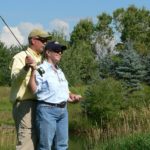
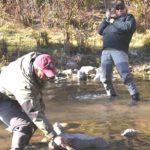
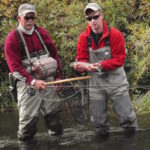
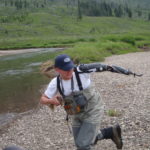
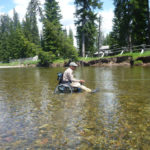
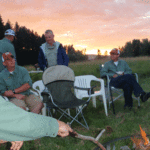
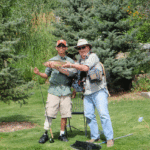
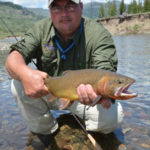






A terrific story from a humble and generous humanitarian and conservationist. Thanks, Dave! You’ve made life-changing differences in hundreds of lives…all for the better.
Dave, Great read and thanks for bringing the river to the warriors that have fought for this country. Mia